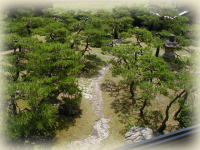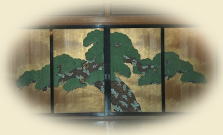
This photograph is a bird-eye view
of the garden of Yoyokaku.
As you see, the main feature of the garden
is these pine trees. Most of them are 200
years old.
In Japanese culture, a pine tree is
especially important, sometimes even divine.
We pay much attention to keep these precious
trees in good shape.
These old trees with cracked barks
and hanging-down branches look like old oriental
philosophers in deep meditation. They are
serene under the bright sky. They are awe-inspiring
in the moonlight. They are gentle when they
spread their yellow mist of pollen in a soft
breeze in spring, and after the rain they
are just heart-healing with so many pearly
dews on their needles.
Some thirty years ago, these pine trees
were hearing a beautiful sound of violin
every morning. A young American with
a gentle manner and outstanding intelligence,
with a love of nature and oriental culture,
was staying here at Yoyokaku for the first
three months of his days in Japan. He started
his morning with his violin amidst these
trees. The garden was filled with the sound
of sea-breeze that passed through the pine
twigs, and the violin was leading the orchestra
of trees.
His name was Terry Welch, who left
Yoyokaku to go to see the other places of
Japan including the big city of Tokyo and
the old cities of Kyoto and Nara. My husband
and I were not surprised to hear that he
became a landscape architect later.
Each time he returns to Yoyokaku, he
tries to persuade me to come and visit his
own garden in Woodinville, Washington. My
husband went, but I couldn't go with him.
I have always to stay to take care of our
ryokan. How I wish I could take some days
off before I get too old! Terry always shows
me the photos of his ever-progressing Japanese
garden in the vast land he owns. His garden
has often appeared in books and calendars.
Around his ponds ( he has two) he planted
iris, rhododendron, azalea, plum, cherry,
...and so on. Of course he has magnificent
pine trees. And the birds! Even beavers!
Oh, how I wish I could really see them!
He says that the garden of Yoyokaku
has transformed his life. Did our pine trees
lure him? Or, I imagine, Terry Welch himself
must have trembled the trees with his magic
violin and exchanged sympathy with them.
As I wrote before, a pine tree is often
thought to be the receptor upon which the
gods might descend from the heaven. It is
no wonder that the pine trees of Yoyokaku
have stimulated Terry Welch's compassion@with
nature.
I asked Terry to write an essay
on our garden for my web page.
Please enjoy yourself reading it, and if
you ever have a chance to go near Seattle,
I hope you will visit him and see his heavenly
Japanese Garden. |
| Yours, |
|
 |
| [The garden of Yoyokaku] byt.r.welch Mail to Harumi Okochi |
|

